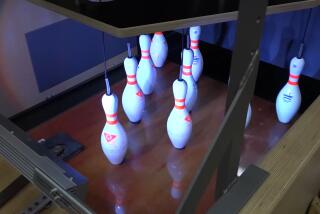Different Strokes : A Valencia Company’s Versatile Tennis Practice Machine Has the Competition on the Run
- Share via
Jack C. Scott’s Valencia company, Crown Manufacturing, is the biggest name in tennis ball practice machines. This year he will sell about $2.5 million worth of those little electric boxes that keep shooting practice balls across the net to tennis pros and weekend athletes honing their strokes.
Scott admits that he fell into the tennis business out of passing interest rather than passion. He was the owner of a small air-conditioning contracting business in Northridge in 1974 when he took up tennis and built a court in his back yard because “it was easier than mowing the lawn.”
To practice, Scott--a self-taught mechanic--looked around for a machine that fires tennis balls in rapid succession. But he wasn’t happy with what was on the market. At the time most tennis ball practice machines were noisy, air-powered devices with only a few speed controls, and there was no way to adjust the spin on the ball. So Scott, an inveterate tinkerer, decided to build his own.
Fifteen years later, Scott’s hobby has turned into his livelihood. Crown Manufacturing is widely considered to be the largest supplier of tennis ball machines in the country. Scott, 54, made a full-time commitment to his tennis enterprise in 1983 when he sold his air-conditioning business. After two decades in air conditioning he was looking for a change and tennis was more fun, he said.
Crown’s machines, which are marketed under the Match Mate brand name, sell for between $2,395 and $6,000 and are used by tennis clubs and schools, people who own their own courts and by professional tennis players, Scott said. While some of Crown’s competitors make lightweight, portable ball machines that sell for less than $1,000, the Match Mate line is considered the Mercedes-Benz of the industry.
“Their machine is very sophisticated,” said Larry Brink, owner of Fraser-Edwards Sports, a San Raphael-based tennis equipment distributor that previously sold other types of ball machines but now sells only the Match Mate line. “There’s really nothing like it on the market,” he said.
Scott says he captured the market by targeting teaching professionals at tennis clubs and schools, as well as individual court owners, with a product that wipes his competitors off the court.
Crown’s machines look like large metal boxes with wheels and hold up to 375 balls. Standing about three feet tall and weighing 95 pounds, the electrically run units use rotating wheels to spit out balls at adjustable speeds of up to 100 m.p.h. Various knobs, buttons and dials allow the user to control the direction, height (from lobs to volleys) and amount of spin on the ball (top spin and under spin)--and even program the machines to fire different shots in a random pattern. By comparison, one of Crown’s major rivals sells a tennis ball machine that doesn’t have any spin adjustments. And Crown’s machines even come with remote controls so they can be turned on or off from anywhere on the court.
Last year Scott also began making a tennis ball machine for one of his competitors--Scott declined to identify the company--which is resold under a different name. Scott’s biggest competitors are Prince Manufacturing Co. in Lawrenceville, N.J., which is best known for its tennis rackets, and Metaltek of Raleigh, N.C.
Scott estimated that with what Crown sells under its own name and with his private label sales, the two companies have grabbed about 80% of the tennis ball machine market.
Scott, who owns 100% of Crown, says the company has been consistently profitable. He hopes to grow from $2.5 million sales this year to the $3 million plateau in 1990 by pushing harder into foreign markets. Only about 15% of Crown’s current sales are to overseas buyers, including customers in Britain, West Germany and Saudi Arabia.
Crown manufactures about 3,000 machines a year in its Valencia facility and sells them through about 60 tennis and sporting goods distributors. It also makes a few other tennis-related products, such as a device that picks up balls and a sponge roller for cleaning tennis courts.
Crown’s competitors don’t dispute Crown’s claim of being the biggest manufacturer of tennis ball machines, but some do challenge Scott’s assertion that his company makes more than 80% of the machines sold.
Alfred Yarur, president of Metaltek, said his company’s market share totals about 40%. And Bill Rombeau, senior vice president of Tennis Tutor, a Burbank manufacturer of portable, battery-operated tennis ball machines, says Scott’s claim of controlling 80% of the market might be true “within a 10-mile radius of his company.” Nonetheless, Scott stands by his market-share figure.
Although Crown’s machines are considered sophisticated, some tennis professionals say all those gadgets aren’t necessary. Lee Ziff, general manager of the Tennis Place in Los Angeles, a large tennis facility that caters to the public, said the two Match Mate machines used there have been disappointing.
“It’s a little too much engineering,” Ziff said. “Your average person just wants an on-off button. And as you begin to make something more sophisticated, it begins to break down more.”
But Scott countered that if his machines break down more “it’s because they’re used a lot more” than other machines that players find less challenging. Also, he said, even the first machines the company sold are still functioning.
However, Scott believes the market for his machines is limited, even though participation in tennis in the United States has begun to pick up after slumping in the early 1980s. “I don’t think we would ever exceed 5,000 units a year,” he said.
That’s because the machines don’t need to be replaced frequently and because the gradual growth expected in tennis in the coming decade likely won’t justify many more new clubs, Scott said.
So Scott is moving beyond the tennis court and onto the baseball diamond. He plans to introduce a new product this month--a baseball pitching machine that Little Leaguers can use to sharpen their batting skills. He said he also hopes to develop within a year a more sophisticated baseball machine that’s “far better than anything being used now” by professional baseball teams.
With the move into baseball machines, Scott says he hopes to double Crown’s sales in about three years. “I see baseball being as big or bigger than tennis,” he said.
Butch Paulson, president of Jugs Inc. in Tualatin, Ore., the nation’s largest manufacturer of baseball pitching machines, said there’s plenty of room in that market for new competitors. “It’s a good move on their part,” he said. “Baseball and softball are on a roll right now” in terms of the number of children signing up for Little League and school programs.
Scott, who still develops his own product designs, recently created a new position of sales director so he can spend more time tinkering in the shop. “I enjoy making things to the point that if I could just come in and make things and the rest could just happen, that would be ideal,” he said.
And even though his name has become closely associated with tennis, he said he still doesn’t live or die by the game. “It’s a terrible game really,” because of the intense competitiveness it engenders, he said. “I would rather go out and play golf most of the time than play tennis,” he said.
More to Read
Inside the business of entertainment
The Wide Shot brings you news, analysis and insights on everything from streaming wars to production — and what it all means for the future.
You may occasionally receive promotional content from the Los Angeles Times.










